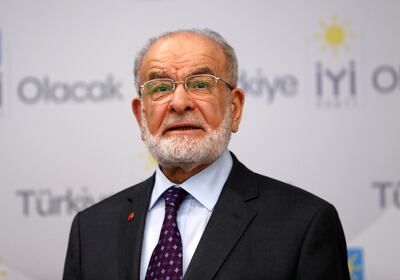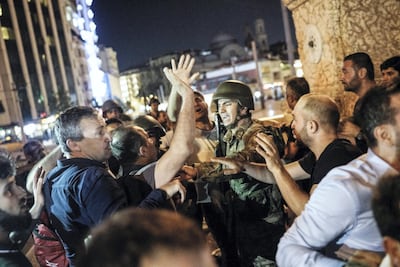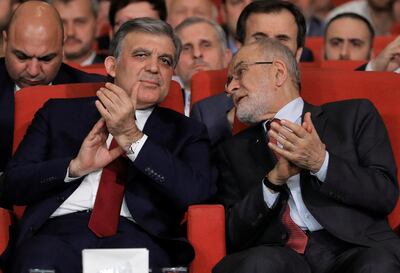Temel Karamollaoglu looks at his country and sees a nation divided, a problem he blames on the ruling party of President Recep Tayyip Erdogan.
Instead of an ally, the leader of Turkey's largest Islamist party that once shared ideological roots with the governing Justice and Development (AK) party, has emerged as one of the most vociferous critics of the country's leadership.
"The policies that Erdogan or his government is following does not help Turkey to really stand up on her own feet in almost all aspects and policies, economic policies, foreign policies," he told The National in an interview. "His method of approach, the discourse causes polarisation in Turkey."
Mr Karamollaoglu, a fluent English speaker who went to university in the northern city of Manchester and is leader of the Saadet (Felicity) party, is also running for president in next Sunday's elections.
The polls are arguably the most important in the history of modern Turkey.
Mr Karamollaoglu's platform is heavy on reforming the economy and combating inequality, while his foreign policy hews closely to that of his mentor and father of the country’s modern Islamist movement, Necmettin Erbakan, once a mentor to Mr Erdogan also.

Now aged 77, he decries the country's ongoing state of emergency, in place since the July 2016 coup attempt, which has been blamed for creating a climate of fear in Turkey, and is considered responsible for the retreat of human rights.
Under emergency rule, the government has dismissed tens of thousands of bureaucrats, academics, police officers and soldiers. The crackdown has gone beyond the coup perpetrators to target dissidents more broadly, leaving them with limited avenues of appeal.
_____________
Read more of our coverage on Turkey's elections:
Erdogan election rival courts Turkey’s Kurdish vote
From prison cell, Erdogan rival questions election legitimacy
Erdogan's election travels expose challenge at home
_____________
"We should not go into elections under extraordinary conditions," said Mr Karamollaoglu, adding that the government was "disrespectful" to the rule of law.
Mr Erdogan and Mr Karamollaoglu are not necessarily natural rivals.
The first leaders of the AK party had split off from Mr Erbakan's political bloc, defined themselves as moderate and generally eschewed political Islam as an ideology of governance. The early years of the AK party's leadership was often held up as a model for the coexistence of Islam and democracy, and President Erdogan's personal piety endears him to religious voters.
The faithful among Mr Erdogan's supporters often cite the mainstreaming of religious identity as an important factor in sticking with him. As an example, when the headscarf was once banned on university grounds and government offices under stringent secularist rules, it is no longer an issue in public discourse.
Public life is no longer the domain of the country's secular elite, so-called 'White Turks' who are Europeanised and look down on conservatives.

But Mr Karamollaoglu blames failed economic policies that have contributed to a widening foreign trade deficit, high unemployment and made Turkey dependent on food imports.
"Turkey 15 years ago was one of [the] countries who had self-sufficiency in food production, now we are importing five million tons of wheat, nearly one million cattle, over 500,000 tons of meat," he said.
"I mean this is bankruptcy."
He has also criticised the decline in freedoms under the state of emergency and new powers for the presidency that were narrowly approved in a referendum last year. Such steps broke down the principle of separation of powers in Turkey, Mr Karamollaoglu contends.
_____________
Turkish opposition nominate candidates for president
_____________
He has also called for a special agreement with the European Union and the abandonment of EU membership talks, saying Turkey's large Muslim population would not make it a natural fit with the bloc.
"We are trying to be a full member of EU, and Europeans themselves say this is impossible, because Turkey is predominantly Muslim, and we agree with that," he said.
"We can have a special partnership with Europe, but we cannot be a part of Europe."
He also said Ankara ought to abandon its commitment to the United States with its pro-Israel policy as a strategic ally, and seek better relations with Muslim countries, in addition to playing a more neutral role in bringing peace to nearby Syria where the country actively backs rebel groups fighting against President Bashar Al Assad.
Mr Karamollaoglu is unlikely to garner enough votes in the presidential contest to win or reach a second-round run-off against Mr Erdogan. But in the parliamentary elections his party is running as part of a coalition that includes the main secularist opposition group, the Republican People’s Party (CHP) and the breakaway nationalists of the Iyi (Good) party.
The alliance makes for strange bedfellows – Islamists and secularists united to end Mr Erdogan's parliamentary majority. Despite ideological differences, Mr Karamollaoglu's party may end up in parliament on the back of the coalition, because without it the party would be unable to cross the threshold of 10 percent of the national vote that is required to enter the legislature.

"This is an alliance for the election but we have certain principles we agreed," said Mr Karamollaoglu.
"Separation of powers is very important, government, parliament and the judiciary should be separate and not influence each other, press freedom, lifting of the state of emergency.
"Because of that we came together."


